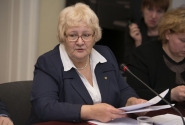
On Thursday, 27 March, the Saeima supported in principle amendments that will establish a new approach to combating psychoactive herbal mixtures and synthetic narcotic substances, thus putting an end to the principle that anything that is not explicitly forbidden is allowed.
The amendments to the Law on Procedures for the Legal Trade of Narcotic and Psychotropic Substances and Medicinal Products are intended to introduce a universally applicable definition of synthetic psychoactive substances and certification thereof, as well as to impose criminal liability for noncompliance.
“Unfortunately, efforts to combat the plague of the so-called legal drugs have been futile so far. We have spent a lot of money on laboratory tests to verify the harmfulness of each specific substance in order to include it in the list of prohibited substances. However, as soon as we ban one specific substance, several derivatives with a slightly modified chemical formula appear on the market. We simply cannot keep up with the drug dealers. That is why we are proposing to change the rules of the game and no longer allow everything that is not explicitly forbidden,” said Aija Barča, Chairperson of the Social and Employment Matters Committee, which is in charge of the Draft Law on Amendments to the Law on Procedures for the Legal Trade of Narcotic and Psychotropic Substances and Medicinal Products.
The amendments envisage a definition of synthetic psychoactive substances and an obligation to submit any products containing such substances to the Health Inspectorate before they can be put on the market. The Health Inspectorate will establish and maintain a register of synthetic psychoactive substances and products containing such substances, as well as require certification of such substances and products at the expense of their distributors.
Administrative and criminal liability is proposed for noncompliance with the new procedure, including imprisonment for up to four years if such noncompliance has lead to a lethal outcome.
The Chairperson of the Committee indicated that Latvia, unlike most countries, has opted for certification of the substances, which means that lawyers will have to elaborate an impeccable definition of the substances before the Draft Law is adopted in the final reading. “We are aware that the dealers will not rush to register these substances. However, these amendments will establish an efficient mechanism for holding liable those who sell poison to our children,” said Barča.
The Draft Law on Amendments to the Law on Procedures for the Legal Trade of Narcotic and Psychotropic Substances and Medicinal Products submitted by MPs must still be considered in the second and third reading by the responsible committee and at the plenary sittings of the Saeima. The related amendments to the Administrative Violations Code and the Criminal Law have also been submitted to relevant committees for consideration.
Saeima Press Service







